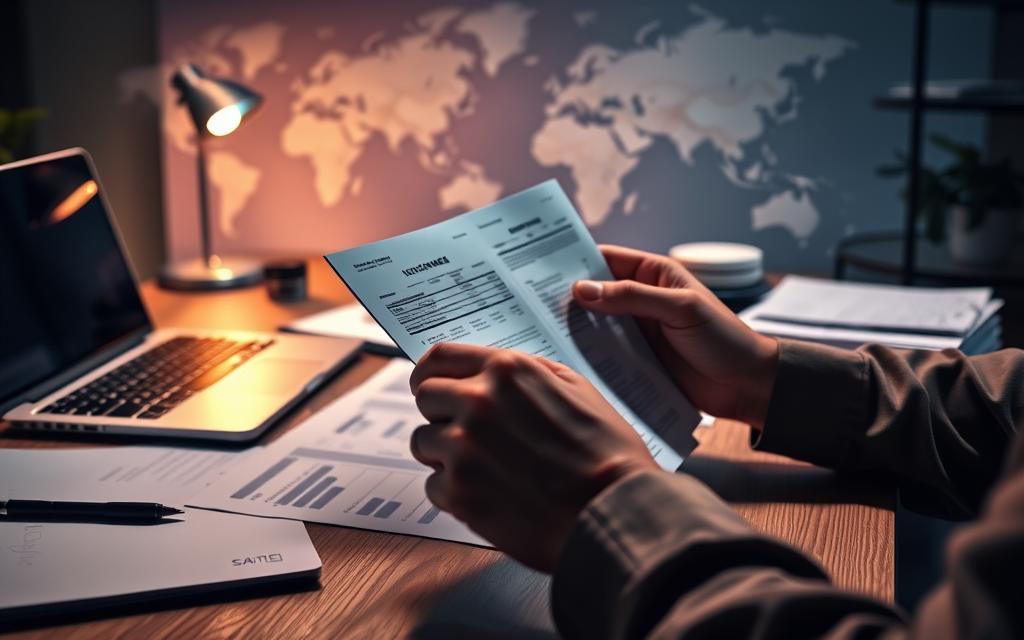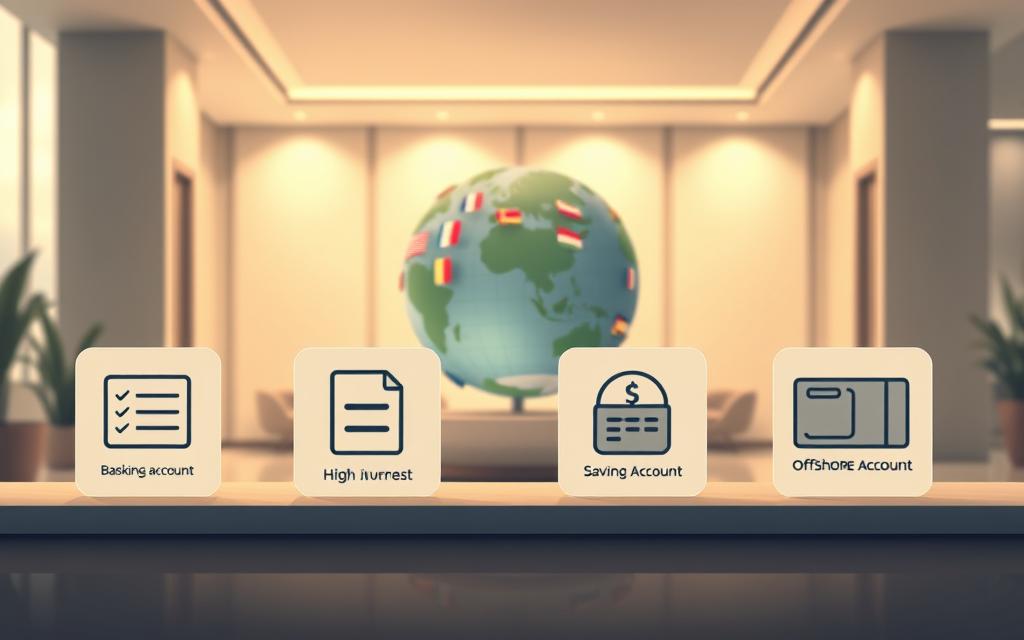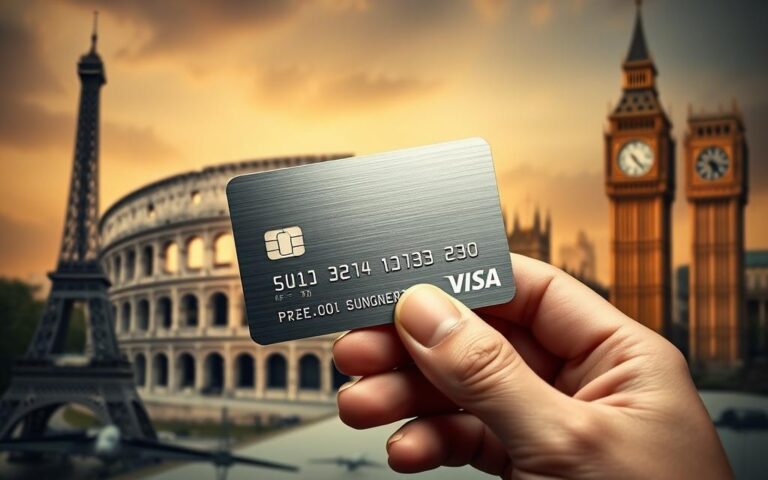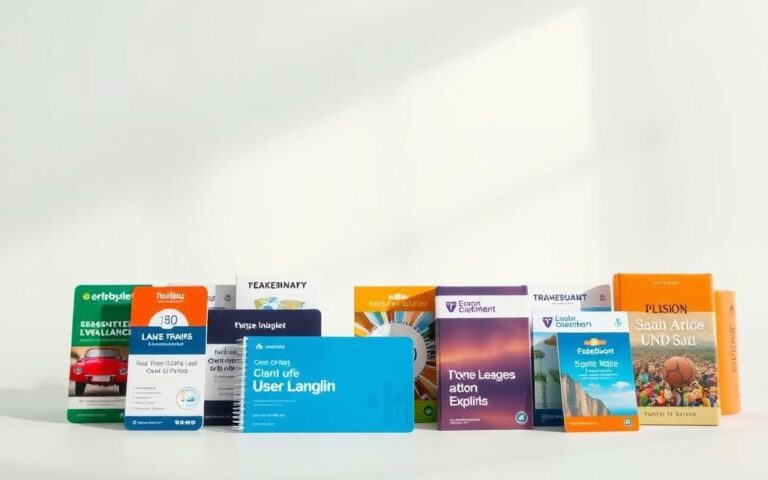Advertisement
More than 9 million Americans live outside the US. They often face financial systems that are different from back home. Knowing how to open a foreign bank account is key for them. A foreign bank account helps with international payments and protects money from local economic issues. It also opens doors to banking benefits for non-residents.
This guide will cover what you need to open a bank account abroad. It’s crucial for those living or traveling outside their home country. Understanding the account types and opening processes helps expats manage their money better.
Understanding the Importance of Foreign Bank Accounts
Having a foreign bank account is key for those living abroad. It helps them handle their money better in new places. Knowing how to set up an account outside your home country is vital for taking advantage of its benefits.
What is a Foreign Bank Account?
A foreign bank account is one located outside your home country. These accounts come in different forms like savings, checking, and investments. They are designed for expats’ global banking needs.
Why Foreigners Need Foreign Bank Accounts
Foreigners need local banking services for many reasons. A foreign bank account makes daily tasks easier, like paying for things or getting paid. It also helps them get used to the local money system. Plus, it’s great for handling money in different currencies safely.
Key Benefits of Having a Foreign Bank Account
There are big perks to opening an account abroad. Here are some main advantages:
- Save money on fees for moving money in different currencies.
- Better access to local loans and credit.
- Track and manage your funds online easily.
These benefits make banking abroad better for expats. For more help, looking at a guide to foreign bank accounts can be very useful.

Types of Foreign Bank Accounts Available to Foreigners
Foreign banks offer a range of accounts for expats and foreigners. These accounts meet various needs, like handling daily money matters, saving, or dealing with different currencies. Knowing the choices helps in picking the right bank for financial stability abroad.
Checking Accounts
Checking accounts are handy for daily money access. They support regular transactions like paying bills, transferring money, and shopping. With debit cards and online banking, these accounts make financial management easy from anywhere.
Savings Accounts
Savings accounts have higher interest rates than checking ones. They attract those wanting to increase their savings. For foreigners, these accounts often come in different currencies, offering a chance to earn interest and keep the money accessible.
Certificates of Deposit
Certificates of Deposit (CDs) are for locking away money for a set period, which usually leads to higher interest earnings. They are best for people who can set aside cash for a while. It’s crucial to compare the terms and rates at different banks to get the best deal.
Foreign Currency Accounts
Foreign currency accounts handle multiple currencies, perfect for expats who regularly deal with various currencies. These accounts lessen the risk from changing exchange rates. Having one of these accounts can make managing money while living in another country easier and more stable.

Factors to Consider Before Opening a Foreign Bank Account
Before you open a foreign bank account, it’s key to know certain factors. These factors will shape your banking experience. Knowing what’s needed for the account is vital for a smooth start.
Residency Requirements
Your living status affects if you can get a foreign bank account. Many banks need a local address from customers. Knowing this helps you see if you qualify for an account as a non-resident. Some banks have accounts made for people living elsewhere.
Banking Fees and Charges
Looking into banking fees is crucial for managing a foreign account. Some banks might seem cheap at first, but later you find hidden costs. Checking the fees closely helps avoid surprises. This step is key for opening an offshore account the right way.
Access to Online and Mobile Banking
Being able to bank online or on your phone makes things easier. You can handle your money from anywhere. This is really helpful for managing a non-resident account well.
Customer Service and Support
Good customer service is very important when picking a bank. If you have problems, strong support helps you solve them. A bank with good customer service makes dealing with foreign account issues easier.
Top Banks for Opening a Foreign Bank Account
Many banks offer special services for people living in another country. The best ones have bank accounts just for foreigners. They understand the different needs expats and international clients have. Let’s look at some top banks known for their great options for people from other countries.
HSBC
HSBC is famous for its large international network and services for expats. It has accounts for checking and saving that are foreigner friendly. These accounts come with features like global money transfers and accounts in multiple currencies.
Citibank
Citibank is a top pick for its excellent online banking. Foreigners like it because you can manage your money from anywhere. It has competitive fees and gives outstanding customer service.
Barclays
Barclays offers a wide range of banking services to foreigners, making it easier to open accounts in different countries. Its online platform is easy to use. It’s perfect for those who need to access their money while they’re not at home.
Deutsche Bank
Deutsche Bank is known for helping customers efficiently and with their investments around the globe. It has special accounts for those living outside their home country. This makes banking easy for non-residents.
How to Open a Foreign Bank Account as a Foreigner
Want to open a bank account overseas? You’ll need to know a few important things first. This guide is perfect if you’re moving abroad and need international banking. It makes understanding what you need and how to apply simple.
Required Documents
The documents needed differ from place to place. Usually, you’ll need:
- Valid passport
- Proof of residential address
- Reference letter from your home bank
Collecting these documents is key. They make sure you meet the rules of the foreign country’s banking system.
Step-by-Step Application Process
The steps to apply are:
- Look into different banks to find the best one.
- Fill out the application form they give you.
- Hand in the documents they ask for.
- Sometimes, you might have to do an interview in person.
Being careful with each step can make things go smoothly. This is especially true for expats banking internationally.
Potential Challenges
Opening an account in another country can be tough due to:
- Complicated rules
- Language problems
- Each bank having its own set of rules
Knowing about these issues can help a lot. It makes dealing with the complex parts of opening a bank account easier.
Managing Your Foreign Bank Account Effectively
Handling a foreign bank account well means knowing a lot about international banking, especially for expats. It’s important to get international transactions, currency exchange, and security right. This is vital for keeping your money safe while living in another country.
Understanding International Transactions
International transactions can differ a lot in fees and how long they take, based on the bank. Banks that are good for foreigners make transferring money easier. But, it’s key to know about the fees and exchange rates. Knowing this helps expats get the most out of banking abroad.
Currency Exchange Considerations
For expats, thinking about currency exchange is very important. Exchange rates change and can affect your money when you switch currencies. Expats should watch these rates and use banks that give good exchange deals. This can prevent losing money and lead to better financial decisions.
Security Measures and Fraud Prevention
Online banking is common, so keeping your account safe from fraud is crucial. Banks use many security steps for expat accounts. These include things like two-factor authentication and alerts for odd activities. Knowing about these can help expats keep their money safe and give them peace of mind.
Common Mistakes to Avoid When Opening a Foreign Bank Account
Opening offshore bank accounts may seem exciting, but many expatriates miss important details. This oversight can lead to unexpected financial issues. It’s key to consider fees and charges that add up over time. When looking into foreign bank accounts, don’t forget to check for annual fees, transaction costs, and withdrawal limits.
Ignoring Fees and Charges
Many people forget to check the fees that come with a foreign account. Knowing these fees beforehand can save you from surprises. Be sure to read up on your bank’s fee schedule. This helps you stay informed about costs.
Not Researching Bank Policies
Skipping research on the bank’s specific policies is another mistake. Each bank has its own rules on withdrawals and deposits. Getting to know these policies helps avoid problems with accessing your funds.
Failing to Understand Tax Implications
Understanding tax implications is crucial for foreign bank accounts. Some expats overlook the need to report these accounts in their home country. This oversight can cause legal issues. So, it’s vital to understand the tax effects of overseas accounts.



